Kinect engineers compete for investment at Microsoft Accelerator
- Published
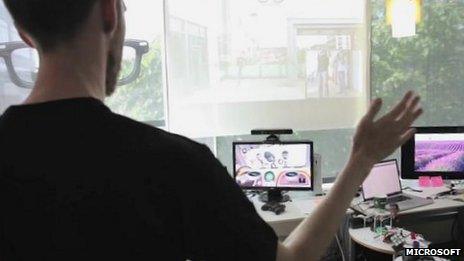
Participants were invited to Microsoft's Seattle headquarters to receive advice about how to develop their products
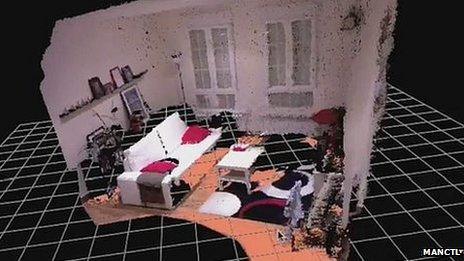
Manctl wants to make it easier for people to be able to create 3D scans of their environments

Freak 'n Genius allows users to create 2D animations in real-time by copying their body movements
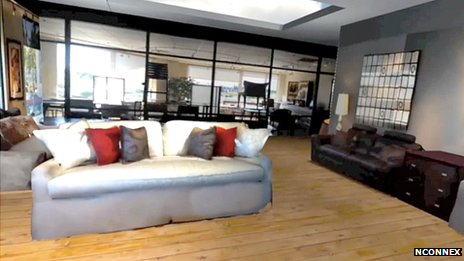
Nconnex allows users to place a piece of virtual furniture in a room in their home to see if they think it would fit

Gestsure Technologies allows surgeons to navigate patient MRI and CT scans in the operating room while staying sterile
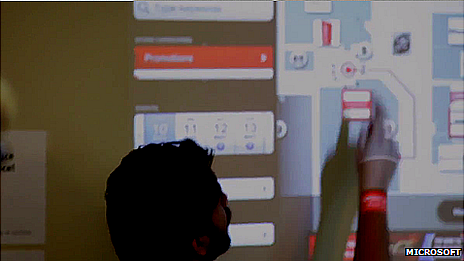
Ubi Interactive turns any surface into a multitouch screen, allowing projected images to become interactive displays
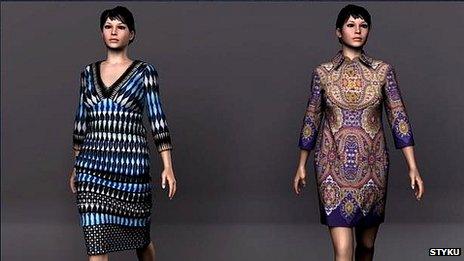
Styku uses Kinect to offer online shoppers a virtual fitting room so they can see how different sizes of clothes would look on then
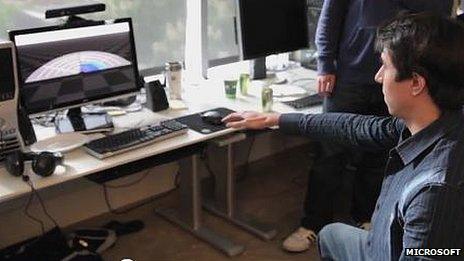
Jintronix wants to help rehabilitate stroke patients by encouraging them to carry out exercises while interacting with a virtual environment
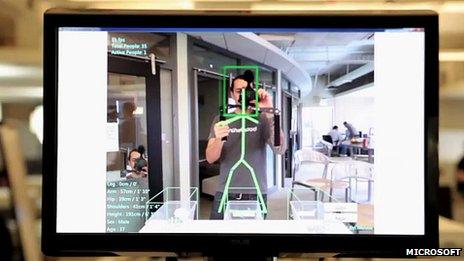
Kimetric is designed to allow retailers to analyse consumer behaviour using sensors placed around their stores
Microsoft has tried to fast-track business software for its Kinect sensor by acting as a matchmaker for promising start-ups and investors.
It helped 11 firms develop products over three months, then presented them to an audience of venture capitalists and other potential backers.
Projects included a tool to help stroke patients regain movement and a way to make any surface a touch interface.
Kinect has been a hit on the Xbox, but competes against other devices on PCs.
The motion and sound sensor was originally released on the games console in November 2010. A more expensive model designed for Windows-based PCs followed earlier this year.
Virtual changing room
More than 500 start-ups competed for a place in Microsoft's Accelerator programme. The selected 11 were each given $20,000 (£12,815) in seed funding, offered access to the company's technology and given business and engineering advice by its employees at its Seattle headquarters.
The scheme climaxed on Thursday when investors were invited to see each company demonstrate their invention.
Participants included:
Nconnex whose software lets users place virtual items of furniture in their home so that they can get a sense for whether the real-world item would be suited for their space.
Zebcare which is building a service to allow families to monitor old-aged relatives without having to stream images or video.
Styku which has created a virtual fitting room. It lets users try different sizes of clothing on an avatar which matches their body shape and movements so they can make sure the items fit.
Kimetric and its solution for retailers wanting to study how shoppers behave across their stores so they can change their shop layouts to boost sales.
Sceptical paymasters
One user-interface expert told the BBC that investors were traditionally cautious of such innovative ideas.
"There are a lot of potential uses for immersive technologies like Kinect both from businesses wanting to analyse their customers' behaviour to consumers being able to get different types of feedback from their actions," said Brian Blau, research director in consumer technologies at Gartner.
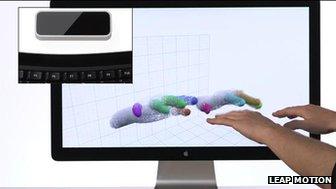
Leap Motion says its gesture sensor is more accurate than a mouse
"Up until now most work done with the device outside the Xbox has been limited to experiments. What these companies are trying to do is hard and brand new, and that can make it hard to attract funding when they have still to prove they can add business value."
Microsoft may also be mindful that other companies - like SoftKinetic and Leap Motion - have developed more accurate motion-tracking system.
"The issue Microsoft has to face is that other sensor makers are doing deals with TV and PC-makers to embed their products in future devices," Mr Blau added.
"But schemes like this should help keep the Kinect at the forefront of developer's minds."
With its involvement in the first Accelerator programme now over, Microsoft is accepting applicants for a follow-up scheme ahead of a 13 July deadline.
- Published8 June 2012
- Published31 May 2012
- Published9 May 2012